 Toothbrushes are wonderful things. It’s believed that the first toothbrushes originated in Mesopotamia in 3500 BC. Modern toothbrushes as we know them appeared in China from roughly 600 AD and used hog bristles to clean teeth.
Toothbrushes are wonderful things. It’s believed that the first toothbrushes originated in Mesopotamia in 3500 BC. Modern toothbrushes as we know them appeared in China from roughly 600 AD and used hog bristles to clean teeth.
Ever since then, the design of toothbrushes has changed very little, although the materials have! They’re the absolute foundation upon which good dental health is built. In 2003, toothbrushes were even chosen by Americans as the number one invention they couldn’t live without.
You may think that having a toothbrush and using it daily is enough to stave off potential dental issues. Unfortunately, too often, toothbrushes aren’t cared for properly. In dramatic instances, this can lead to the reversal of the benefits of tooth-brushing, and can even cause dental issues.
Toothbrush Care Before and After Use
Below are the best-practices for toothbrush care, both before and after-use:
- Wash your hands thoroughly before handling your toothbrush. This might seem like a bit much, but your hands are the home of a whole host of pathogens, which could find their way onto your brush
- Be sure to rinse your toothbrush properly before use
- After use, another thorough rinse is in order
- After rinsing your toothbrush, be sure to give it a few strong shakes to get rid of excess water
- Allow your toothbrush to dry between uses
Store Your Toothbrush Correctly
Perhaps the most important aspect of correct toothbrush care is storage. If you store can your toothbrush appropriately, it’s one of the safest bets to avoid bacteria.
- Store your toothbrush upright. This allows for easier drying of the brush by letting the water drain from the bristles. It also prevents the brush from coming into contact with scum
- When travelling, try to use a plastic carry case for your toothbrush, to avoid flattening and damaging the bristles
- Be sure to keep your toothbrush at least half a metre from the toilet. This is to avoid the trace bacteria that engulfs the area around a toilet following a flush
- Do not store your toothbrush in a closed container; or in a cupboard
- Your toothbrush holder itself ought to be washed at least once a week, to avoid the accumulation of bacteria
- Make sure that your toothbrushes don’t come into contact with the bristles of another toothbrush, this can transmit bacteria
How To Clean Your Toothbrush
Before considering discarding your toothbrush, and replacing it with a new one; there are a few effective methods to disinfect and clean tour toothbrush, to keep it useful for a while longer.
Here are some of the most common methods:
- Use antibacterial mouthwash to soak your toothbrush for a time (just be sure to give the toothbrush a thorough rinse afterwards)
- Hydrogen peroxide can also be used for everyday cleaning. Simply store your toothbrush in a small cup of hydrogen peroxide
- Steep your toothbrush in boiling water for three minutes. This will kill most germs
Of course, while these methods may extend the life of your toothbrush, after a time it becomes necessary to replace it.
When To Replace Your Toothbrush
It’s generally recommended that you change your toothbrush every three to four months (or the head, if you use an electric toothbrush).
Otherwise, a good way of knowing if it’s time for a replacement is if the bristles are frayed far beyond their initial shape.
Other General Tips
There are a few other miscellaneous practices that represent an important component of toothbrush care:
- Don’t share toothbrushes, yes not even with a partner!
- It’s extremely vital to keep your toothbrush away from people with colds
- If you drop your toothbrush on the floor, clean and sanitise your toothbrush before using it again
Appropriate toothbrush care is the backbone of any good dental defence. It will help prevent many of the most prominent dental issues that members of your family could come up against. At Care Dental Camberwell, we’re not just reactive – we’re proactive.
If you have any questions, reach out to our dentists in Camberwell.
